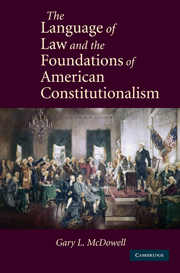Book contents
- Frontmatter
- Contents
- Preface and Acknowledgments
- The Language of Law and the Foundations of American Constitutionalism
- Introduction: The Politics of Original Intention
- 1 The Constitution and the Scholarly Tradition: Recovering the Founders' Constitution
- 2 Nature and the Language of Law: Thomas Hobbes and the Foundations of Modern Constitutionalism
- 3 Language, Law, and Liberty: John Locke and the Structures of Modern Constitutionalism
- 4 The Limits of Natural Law: Modern Constitutionalism and the Science of Interpretation
- 5 The Greatest Improvement on Political Institutions: Natural Rights, the Intentions of the People, and Written Constitutions
- 6 Chains of the Constitution: Thomas Jefferson, James Madison, and the “Political Metaphysics” of Strict Construction
- 7 The Most Sacred Rule of Interpretation: John Marshall, Originalism, and the Limits of Judicial Power
- 8 The Same Yesterday, Today, and Forever: Joseph Story and the Permanence of Constitutional Meaning
- Epilogue: The Moral Foundations of Originalism
- Index of Cases
- General Index
Introduction: The Politics of Original Intention
Published online by Cambridge University Press: 05 June 2012
- Frontmatter
- Contents
- Preface and Acknowledgments
- The Language of Law and the Foundations of American Constitutionalism
- Introduction: The Politics of Original Intention
- 1 The Constitution and the Scholarly Tradition: Recovering the Founders' Constitution
- 2 Nature and the Language of Law: Thomas Hobbes and the Foundations of Modern Constitutionalism
- 3 Language, Law, and Liberty: John Locke and the Structures of Modern Constitutionalism
- 4 The Limits of Natural Law: Modern Constitutionalism and the Science of Interpretation
- 5 The Greatest Improvement on Political Institutions: Natural Rights, the Intentions of the People, and Written Constitutions
- 6 Chains of the Constitution: Thomas Jefferson, James Madison, and the “Political Metaphysics” of Strict Construction
- 7 The Most Sacred Rule of Interpretation: John Marshall, Originalism, and the Limits of Judicial Power
- 8 The Same Yesterday, Today, and Forever: Joseph Story and the Permanence of Constitutional Meaning
- Epilogue: The Moral Foundations of Originalism
- Index of Cases
- General Index
Summary
At 2:00 pm, on Friday, October 23, 1987, the United States Senate committed what many considered then – and what many still consider today – to be an unforgivable political and constitutional sin. Wielding their power to advise and consent on presidential nominations to the federal courts, the members of the upper house voted 58–42 not to confirm Judge Robert H. Bork to the Supreme Court of the United States, the post for which President Ronald Reagan had nominated him nearly four months earlier. The vote, which was the largest margin of defeat in history for a nominee to the Supreme Court, concluded one of the most tumultuous political battles in the history of the republic.
The Senators perhaps had every reason to believe that that would be the end of the story. However ugly it had been, however much time it had taken, Judge Bork's defeat was only one more routine sacrifice to partisan politics. But time would prove wrong anyone who actually thought that. The unprecedented vote against his confirmation reflected something far more fundamental than an ordinary partisan standoff. The battle over Bork was politically transformative, its constitutional lessons enduring.
- Type
- Chapter
- Information
- Publisher: Cambridge University PressPrint publication year: 2010

